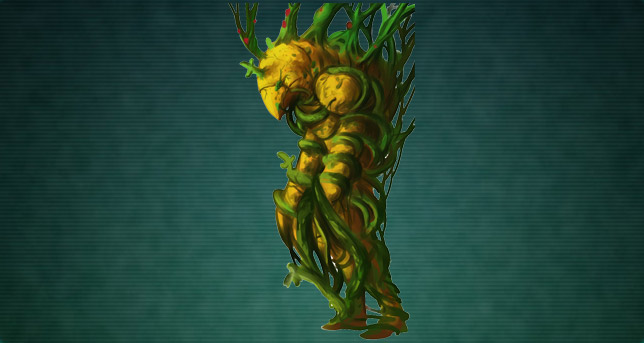Nettori

- Planet
- BSL
- Region
- Sector 2 (TRO)
A giant golden Torizo statue that has been entangled in vines. This creature is the source of the tangled vines infesting Sector 2 (TRO) and the station's reactor core. The Nettori seems to have formed once the X infected the plant life of Sector 2 and eventually spread through the rest of the station. The Nettori has absorbed the Plasma Beam powerup and will fire it at Samus once the statue has been heavily damaged.
The Nettori is protected by several Samus Eater plants and spore pods. The plants release a steady cloud of volatile spores that explode on impact. In addition, the floor surrounding the plants is covered with a thick layer of vines, creating slippery footing. Perhaps the vines also purposefully drag Samus in...
The battle is in some ways similar to the Mother Brain fight from the original Metroid, as you have to avoid flying projectiles and fire on a large stationary target. Your best bet is to stand on the large platform right in front of Nettori. Fire Super Missiles at the spore pods hanging from the ceiling to stun them, then let loose another volley at Nettori. It can also be damaged with the Charge Beam.
Those Samus Eaters and pollen spores make this one of the more annoying fights. If you fall into the Samus Eaters, just hold still for a moment, and you will be able to jump out. Don’t struggle to break free! They will only hold onto you tighter.
Another strategy is to hide behind the left-most platform and drop a constant stream of Power Bombs. The pollen cannot reach you behind this platform and the bombs will damage Nettori. Repeat this until the pollen plants are destroyed.
Once the pollen plants have been destroyed, the Nettori will begin firing the Plasma Beam at you. Jump to avoid the beam and continue firing Super Missiles. The Nettori should be defeated in about 25 hits. Afterward, you fight a Type B Core X. Defeat the Core X to collect the Plasma Beam.
The Japanese name seems to combine the words for “root†(æ ¹) and “bird†(é³¥). It is also often commonly referred to as simply the “Chozo Statueâ€.


